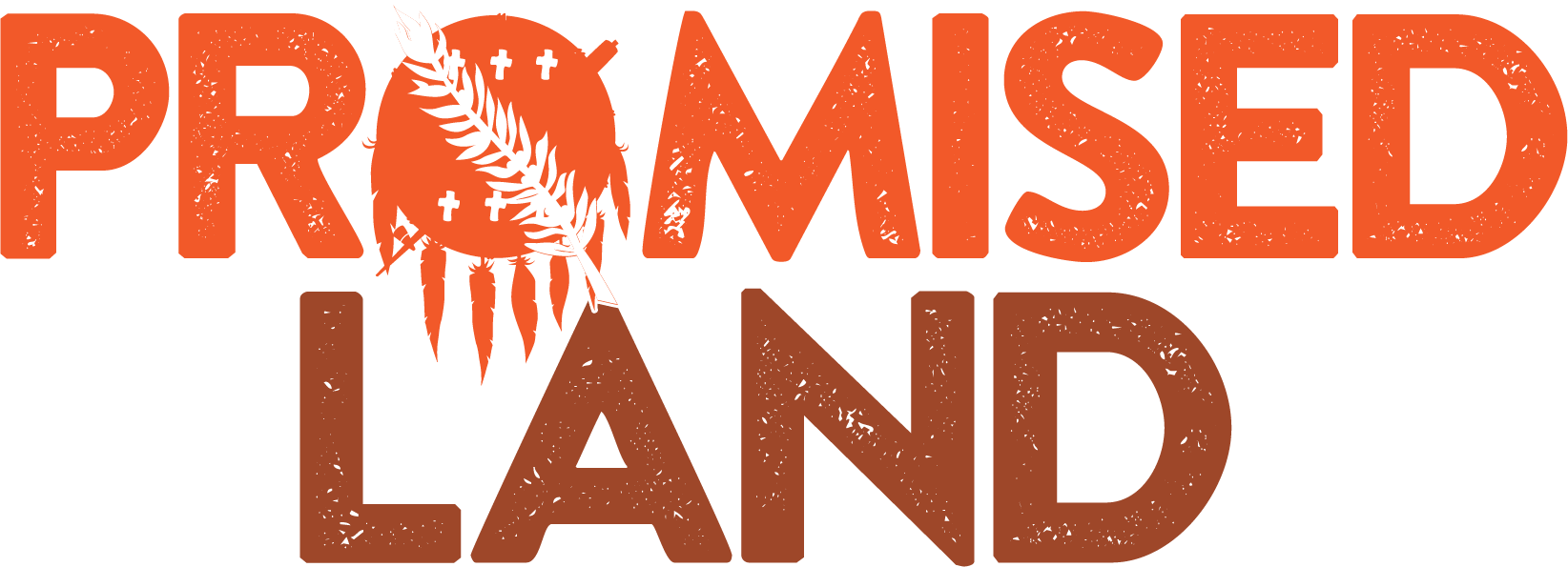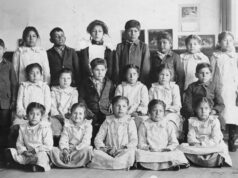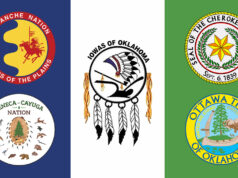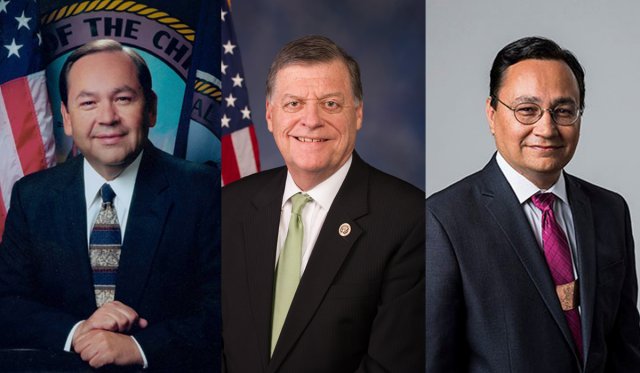
Leaders of the Cherokee Nation and Chickasaw Nation announced their support Monday for federal legislation being proposed by U.S. Rep. Tom Cole that would allow the two tribes to negotiate compacts with the state of Oklahoma on criminal jurisdiction issues. But the language of the proposed bill — revealed below — has other potential implications.
The legislation marks the latest development in government-to-government relations after the landmark 2020 McGirt v. Oklahoma case, in which the U.S. Supreme Court ruled that the Muscogee Nation’s historic reservation had never been disbanded.
The Muscogee Nation is not covered under the Cole bill announced Monday, and Muscogee Chief David Hill said any congressional proposal needs to be crafted carefully.
This story is a part of the Oklahoma Media Center’s Promised Land collaborative effort, which shows how the landmark McGirt v. Oklahoma decision will affect both tribal and non-Indigenous residents in the state.
“We support every nation’s sovereignty and right to seek their own specific legislation affecting only them. We are reviewing the broad wording of this proposed act to understand its implications for not only the Muscogee Nation but all of Indian Country,” Hill said in a statement. “It is imperative that any bill that may be crafted is done so in a way that does not create a perverse incentive for the federal government to withhold funding and force tribes into compacts against their will.”
After the SCOTUS decision, Oklahoma appellate courts also affirmed the reservations of the Cherokee, Chickasaw, Choctaw and Seminole nations, which first and foremost means only the tribes and the U.S. federal government — but not the state of Oklahoma — have jurisdiction over Major Crimes Act violations involving tribal citizens on reservation land. Across eastern Oklahoma, hundreds of state-prosecuted criminal cases have been invalidated and must now be retried or pursued in federal court.
Since the SCOTUS ruling, however, the designation of the reservations as Indian Country has been shown to have other implications in Oklahoma, such as environmental regulation changes regarding mining and the potential exemption from state income taxes for tribal citizens who live and work within their reservation boundaries.
The newly announced legislation, set to be introduced by Cole (R-OK4) on Tuesday, would apply only to the Cherokee and Chickasaw tribes and only on the topic of criminal jurisdiction, tribal leaders said.
The bill’s language is embedded below, and key elements beyond criminal jurisdiction compacting rules include:
- A new definition of “Indian land,” which is specified as land within the Cherokee or Chickasaw nation reservations, including land held in trust, lands held in fee and land otherwise constituting Indian Country under subsections B and C of 18 U.S.C. 1151.
- Section 4, titled “Reservation Integrity,” which acknowledges the Cherokee and Chickasaw nations’ “boundaries as set forth in [their] most recent treaty or agreement with the United States.”
- That section also specifies that the U.S. secretary of the interior shall not take any land into trust status within the exterior boundary of the reservation of the Cherokee or Chickasaw nations unless the land is taken into trust status for the benefit of that nation or of a citizen or citizens of that nation, or unless the nation consents in writing to the trust status for such land.
- The section concludes by specifying that taking any land within the nation’s reservation into trust in such a manner “shall not alter or diminish any criminal or civil jurisdiction of the consenting nation.”
Those elements of the bill could have implications for the Cherokee and Chickasaw nations’ casinos located on trust land that was taken into trust for other purposes. Other tribes have raised concerns about how many of those casinos were approved by the federal government without substantial scrutiny.
The proposed language would also grant the Cherokee and Chickasaw nations de facto veto power over casino and land-trust efforts of the smaller tribes located within the Cherokee and Chickasaw reservation boundaries. For instance, the Cherokee Nation has long opposed efforts by the United Keetoowah Band of Cherokee Indians to purchase and place land into trust. But two weeks prior to its decision in the McGirt case, the U.S. Supreme Court, in June 2020, declined to hear a Cherokee Nation appeal that attempted to block the UKB — a smaller tribe of Cherokee descendants — from taking 76 acres into trust to develop a tribal and cultural center in Tahlequah.
Lastly, the impact of Part B of the new “Indian land” definition — which says land within a nation’s reservation “title to which is held in fee by an Indian tribe or an Indian subject to restrictions against alienation under laws of the United States” — is not immediately clear, but its implications appear to relate to 25 U.S.C. 177, which requires federal approval of any land sold by a tribe to a non-tribal person.
Seminole Nation Chief Greg Chilcoat did not respond to a request for comment about the Cole bill, nor did leaders of the UKB.
Choctaw Nation Chief Gary Batton released a statement Tuesday after Cole filed his bill, which he called “unnecessary.”
“I am strongly opposed to new legislation on criminal jurisdiction pertaining to the U.S. Supreme Court ruling in McGirt. Legislative pathways that cede tribal jurisdiction to states have historically proven to be a detriment to tribal sovereignty. I believe this legislation is unnecessary,” Batton said. “If Congress wants to assist Oklahoma tribes on criminal jurisdiction, I would encourage funding its trust responsibility for public safety and judicial systems in Indian Country. If any legislation is considered, it should be aimed at strengthening tribal sovereignty.”
‘One of the most significant days since McGirt’
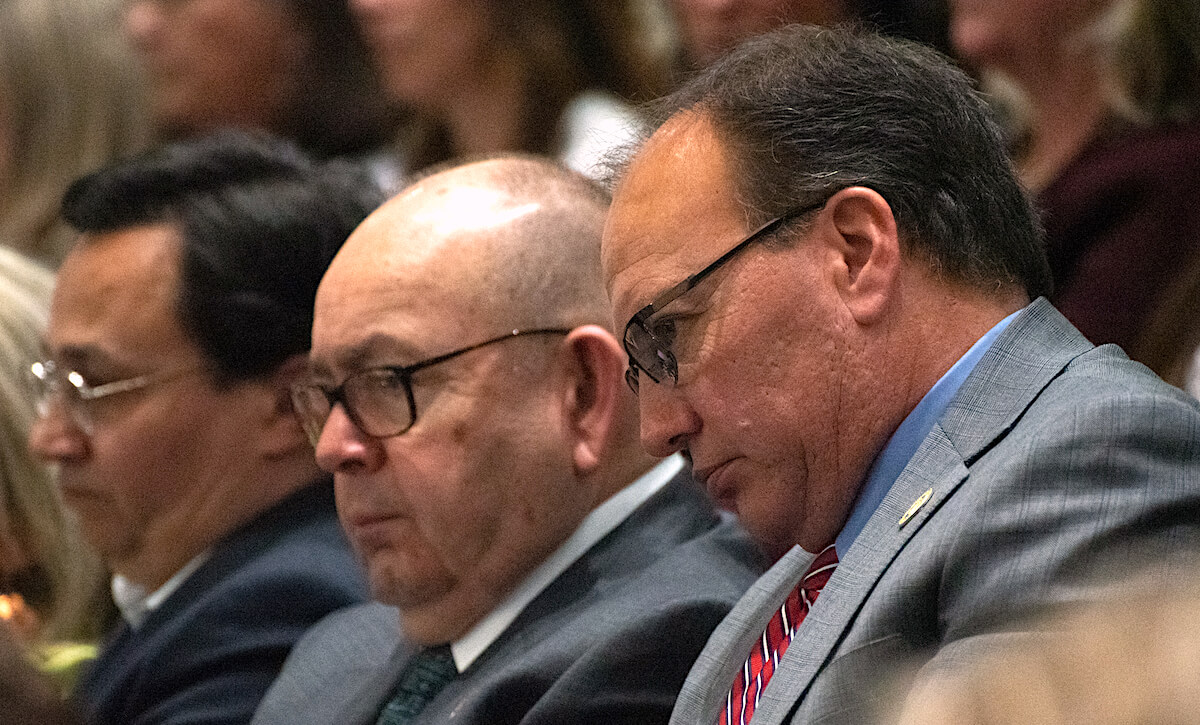
Cherokee Principal Chief Chuck Hoskin Jr. said during a digital press conference Monday that, even with the SCOTUS ruling, tribes still face limitations.
“Today is one of the most significant days since McGirt,” he said. “This legislation will allow us to do what we presently cannot do. Federal law right now shackles the Cherokee Nation, and the Chickasaw Nation as well, and that is our ability to compact in a meaningful way with the state of Oklahoma in terms of certain aspects of criminal jurisdiction. We simply cannot do that right now without Congress allowing the Cherokee Nation and the Chickasaw Nation (to do so). Congressman Cole’s bill will do that.”
Chickasaw Nation Gov. Bill Anoatubby said in a statement that his tribe — of which Cole is a citizen — looks forward to the bill’s passage.
“We appreciate the hard work of the Oklahoma delegation as they work with us, the state and members of the community on criminal jurisdiction matters post the Supreme Court’s McGirt decision,” he said. “We support federal legislation that is based on the core principle of self-determination, clearing the way for us to work with the state as we navigate the best path forward. We look forward to working with our delegation to secure the passage of such legislation.”
Cole released a statement around 1 p.m. Tuesday after formally introducing the language:
Consistent with the diligent work done and progress made with state and tribal partners, this legislation does not mandate how Oklahoma, the Chickasaw Nation and the Cherokee Nation should come to agreement. Instead, the legislation would give them an avenue to decide independently, rightly ensuring that any decision directly affecting Oklahoma or these tribes is made at the state and local level. Indeed, Oklahomans are the best suited for making decisions that affect their own unique communities.
Over the past several months, I have had many serious and productive conversations with law enforcement officers across the Fourth District of Oklahoma. This legislation would provide an immediate solution to the urgent issues facing law enforcement, giving them clarity to enforce the law, keep dangerous criminals behind bars and ensure justice is served.
Hoskin: ‘Compacting makes sense’
Hoskin said the McGirt v. Oklahoma decision has created gaps in criminal jurisdiction.
“Right now, we know certain cases have to be prosecuted by the U.S. Attorney’s office,” he said. “It presupposes those cases that need to be brought forward will be brought forward. We’ll do our end in providing a blanket of protection over the reservation, but the United States has to do its end. Compacting makes sense on some of these cases, particularly when it comes to a non-Indian committing crimes.”
Hoskin said the bill would also respect the tribes’ rights as affirmed under McGirt.
“It doesn’t require that we compact with the state of Oklahoma, and it doesn’t say precisely what that compact should be, although it sets up some narrow parameters in which we would compact,” he said. “It protects Cherokee sovereignty. It protects 100 percent of McGirt. But, it gives us options to compact should we choose to use those options.”
Cherokee Nation Attorney General Sara Hill said the bill would be another tool in the ongoing effort to ensure tribal sovereignty as the nation invests in its own criminal justice infrastructure, including expanding tribal court capacity, budgetary investments and updates to its criminal code.
“This proposal doesn’t give up any of the historic gains the tribes worked so hard for in the McGirt case,” she said. “Since that monumental decision, it gives more tools to the tribe while keeping control of its own future, giving tribes additional tools so that we can encourage further self determination.”
Timeline for Cole bill unclear
Hoskin said he expects Cole’s legislation to be introduced today. As for its timeline, that remains unclear, he said, but Hoskin said he has confidence Cole will be able to get the legislation on track for passage.
“He has a reputation for advancing tribal interests on a bipartisan basis in the Congress,” Hoskin said.
Other members of Oklahoma’s congressional delegation have not commented on the bill.
Hill said predicting passage of legislation in Congress can be tricky.
“At this time, the timeline when you’re dealing with Congress, we’re sort of at the very beginning,” she said. “We don’t even have a bill filed yet. The timeline is difficult. The timeline could shift. I do have a lot of confidence in Congressman Cole.”
Proposed federal legislation
(Update: This article was updated at 1:45 p.m. Tuesday, May 11, to include Tom Cole’s statement. It was updated again to include Gary Batton’s statement.)










